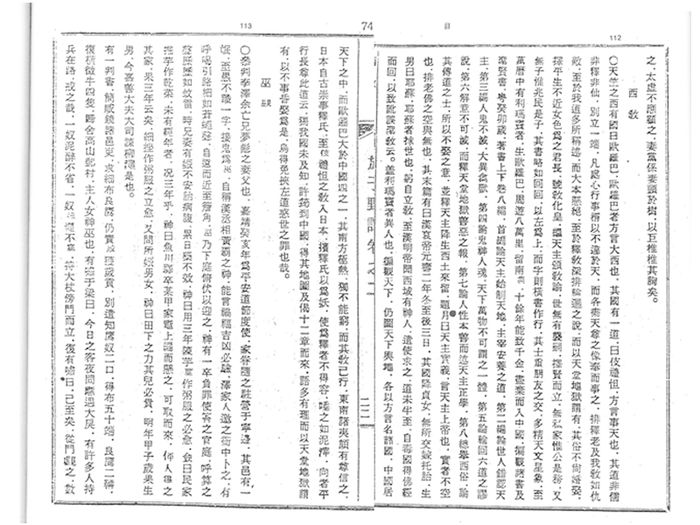"(Translation) 2019 伎利檀"의 두 판 사이의 차이
| 42번째 줄: | 42번째 줄: | ||
---- | ---- | ||
| − | *Discussion Questions: | + | *Discussion Questions:<br /> |
| + | (YO) 別立一端: to erect a different clue [of entrance to the Way] separately <br /> | ||
| + | 不違於天: 違 is more likely "going against" rather than "going away from"<br /> | ||
| + | 無私家,惟公是務。又無子,惟兆民是子: He does not have private family: Only the public [domain] be his concern; He does not have sons: Only the people of his domain be his sons. | ||
| + | |||
| − | |||
2019년 7월 16일 (화) 18:25 기준 최신판
| Primary Source | ||
|---|---|---|
 |
Title | |
| English | ||
| Chinese | ||
| Korean(RR) | ||
| Text Details | ||
| Genre | ||
| Type | ||
| Author(s) | ||
| Year | ||
| Source | ||
| Key Concepts | ||
| Translation Info | ||
| Translator(s) | Participants of 2019 JSG Summer Hanmun Workshop (Intermediate Training Group) | |
| Editor(s) | ||
| Year | 2019 | |
Original Script
Translation
Student Translation : Hector Sanchez
To the west of India, there is Europe. As for Europe, in the local language, it [means] “Far West.” Their countries have one way called kiridan, which in the local language means “Serving Heaven.” Their way is not Confucianism. Nor is it Buddhism or Daoism. It stands alone [because of] one precept [dan, foundation.] In all cases [Europeans] conduct their minds and carry out their affairs by not moving away from Heaven and as for their states, they all draw images of the Lord of Heaven, respect and serve them.
They reject [Huang-]Lao thought, Buddhism and Our School as enemies and opponents. When we get to comparing [them with] the many things our schools teach, their great foundations are extremely distant. When we get to Buddhism, they deeply reject the dogma of samsara and take the Heavenly Halls [Heaven] and Earthly Prisons [Hell] to exist. Their customs do not observe [respect] marriage and [they] choose one who in his whole life has not been near a woman or sexual pleasure and make him their leader, which they call the Emperor of Moral Cultivation [Pope.]
Following the Lord of Heaven, he promulgates teachings and instructs the world. He has no hereditary succession. They choose the worthy and raise them [to the papacy.] He has no private household. Only the public affairs are of his concern. He also has no sons. Only the people are his sons.
Their writing is like that of the Hui people and [they] take the left to be the top and because of this, they write horizontally to make a line. Their scholars emphasize the relations between friends and are heavily proficient in the Heavenly patterns and the appearance of stars.
From Ŏu yadam
- Discussion Questions:
(YO) 別立一端: to erect a different clue [of entrance to the Way] separately
不違於天: 違 is more likely "going against" rather than "going away from"
無私家,惟公是務。又無子,惟兆民是子: He does not have private family: Only the public [domain] be his concern; He does not have sons: Only the people of his domain be his sons.